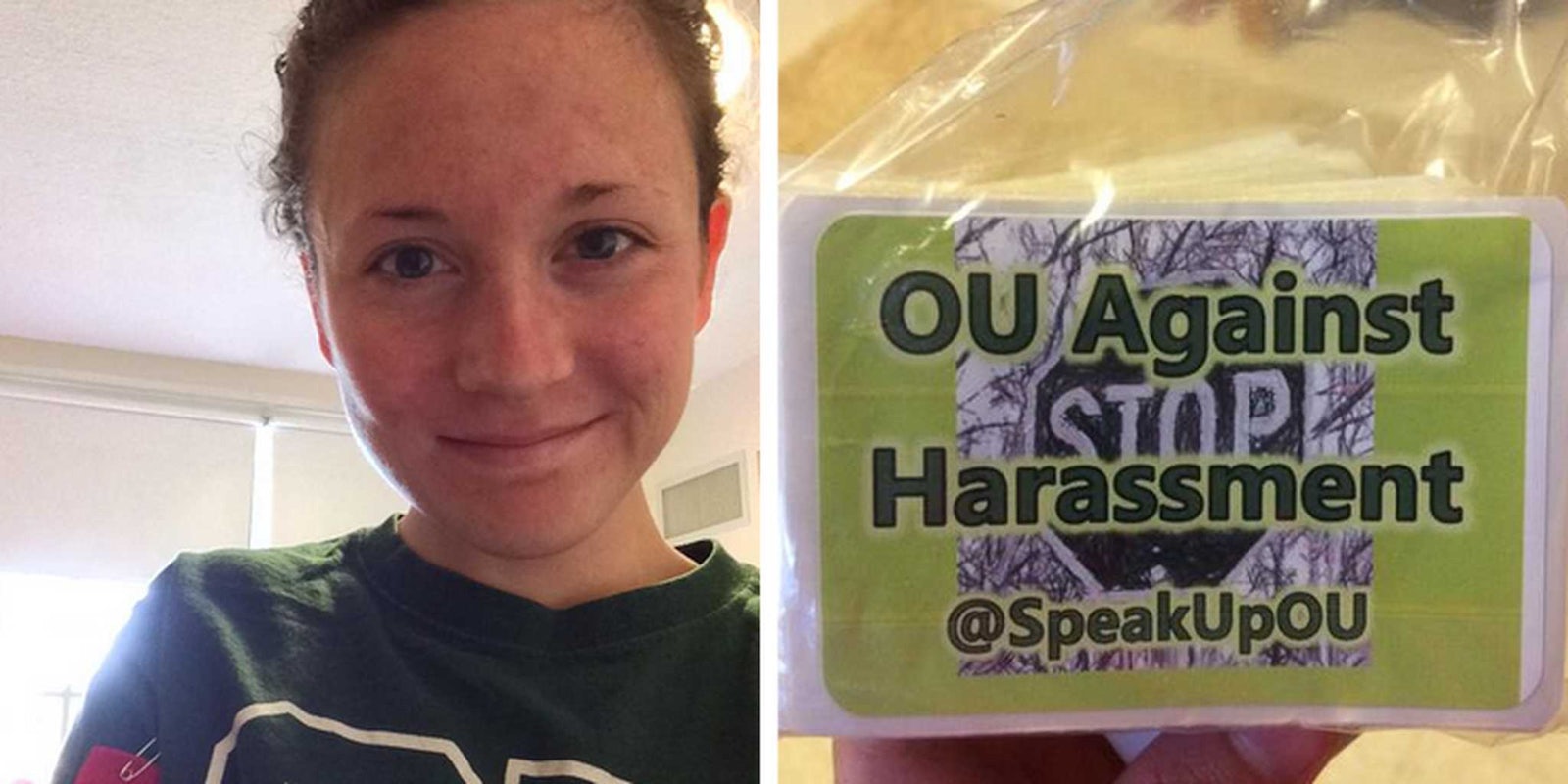As the campus of Ohio University hummed to life over the weekend with students arriving for the start of the fall semester on Monday, Rachel Baker had something else on her mind: sexual harassment on campus.
The 19-year-old sophomore started the Twitter account @SpeakUpOU after being a victim of harassment.
All are welcome to share their experiences with harassment on or around OU campus! @ us !
— OUAgainstHarassment (@SpeakUpOU) August 10, 2015
“As a freshman I had already experienced multiple forms of harassment personally, as had many of the other women I had talked to or befriended,” Baker told the Daily Dot in an email. She set up the account in early August, and reached out to Alex Millard, a writer for feminist blog Feminista Jones, for advice on how to start a grassroots campaign to encourage women on campus to speak up.
Baker’s original inspiration for her account was the hashtag #YouOkSis, made popular by Feminista Jones in the summer of 2014. A post on the blog called “On #YouOKSis and Bystander Intervention” explains the ideology:
So one day I shared this story about how I intervened when a young mother was being harassed on the street. During this conversation, I called on everyone to just try it once…try to intervene when someone is being harassed, but in a way that won’t exacerbate the situation.” @BlackGirlDanger on Twitter hashtagged my question “You ok, sis?” and so this discussion and movement came about.
Baker decided to take this idea of social media-based community support to the OU campus.
“I felt that it was an effective way to build support and share experiences among women who were experiencing harassment and violence because of white supremacist patriarchy and toxic masculinity,” the Ohio native said. “It really empowered people to speak up.”
Baker’s account isn’t the only one on campus meant for helping combat harassment: She points to Better Bystanders (@OHIObystander) and a Fuck Rape Culture (@OUfckrapecultur) as examples. But, she says, hers is slightly different. “The OU Against Harassment account differs in that it is not representing a single student org, and its primary purpose is to be an active amplifying space for students who wish to share their experiences,” she explained.
The social work major has also taken her efforts offline, publicizing the account by passing out stickers she created, with help from her mom.
Swing by the involvement fair today and find me if you would like a sticker! pic.twitter.com/E0siBeQ9tG
— OUAgainstHarassment (@SpeakUpOU) August 23, 2015
Baker’s decision to take action is part of a larger narrative of women taking back their public spaces. The national conversation about street harassment reignited in 2014, after a video of a woman walking through New York for 10 hours showed the prevalence and insidiousness of catcalling. The video, now viewed more than 41 million times, was then emulated in other cities, showing that it was an issue touching thousands of women and making them feeling unsafe in their cities, towns and campuses.
Efforts to combat rape culture on campus have been widespread, as stories of university’s ineffectiveness at helping victims continue to unfold. The most prominent is recent Columbia University graduate Emma Sulkowicz, dubbed “mattress girl” because of the dorm room mattress she carried with her throughout her entire senior year as a protest for the school’s mishandling of her alleged rape by a classmate.
While projects like Baker’s may not be able to combat rape or sexual harassment on a grand scale, she’s hoping it will be a forum for students to share their stories.
“More blame is placed on people who speak up than those who harass,” Baker told her campus newspaper, The Post. “It seems more disruptive to talk about it than the fact that it’s happening in the first place. The overall goal is to challenge that.”
Photo via @SpeakUpOU/Twitter


